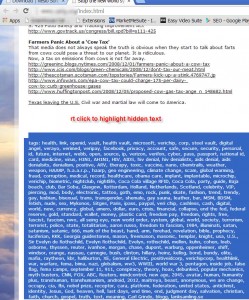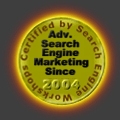 Look how old this is!
Look how old this is! I post at SearchCommander.com now, and this post was published 11 years 7 months 5 days ago. This industry changes FAST, so blindly following the advice here *may not* be a good idea! If you're at all unsure, feel free to hit me up on Twitter and ask.
Today I got an email back from someone that was offended by a link removal request we sent them.
He not only asked “did you even read my site?” but implied that we “must not like my message of truth” and accused us of some desire to censor his opinion.
When I reviewed the site, I admit that I DIDN’T like his message at all, but I still support his right to spew his misguided and ignorant opinions express his point of view all day long.
At his website, I easily found their contact information, and the site seemed legitimate and well put together. The link to our client was on a well organized resource page, it was just a raw link after the company name with no anchor text, and the page itself had a pretty decent backlink profile.
In fact, the longer I looked at the site, I began to believe there was no way we would want this link removed. I looked even more closely at his domain history, at his site backlink profile (not bad), at his content (deep and original), and even his on page SEO basics (they were there) and I was JUST about ready to admit we may have judged him too harshly…
Then I saw it. The whitespace way at the very bottom of his lengthy home page – I click / dragged my mouse over it, and was able to highlight about a dozen lines of hidden text.
BZZZZZZZZ – Game Over
Unnatural = Undesirable
In 2013, being linked to by an idiot playing SEO games has the potential to harm you. You MUST dispel yourself of the notion that “there’s no such thing as a bad link” and I realize that the longer you’ve been in the search game, the harder that is to accept.
I and many others have made that statement before, most quite a while ago (although some even in the past year) but by now Google’s ever evolving Penguin algorithm SHOULD have changed your way of thinking.
Accept the fact that the world is not flat, that there IS such a thing as a bad link, and that undesirable links can and often do, hurt you.
What Makes a Link “Bad”?
Honestly? One could argue that mere fact that it was placed there at all by someone hoping to help or improve another pages rankings makes it bad.
Google judges the intent of the linker, and when anything is even remotely questionable, they do NOT get the benefit of the doubt.
In the old days a link from a crummy site was simply ignored, but now, not only can Google hold it against you, they sometimes even point out examples in your Webmaster Tools account.

Can’t Find Anything Wrong?
Look harder. Find a reason to GET RID of that link, not a reason to keep it. Many times at first glance a site may seem harmless or perhaps even helpful, and your first thoughts might be “well that’s not too a bad link”, and you might be tempted to keep it just “in case it helps”.
However, I say, be strict. Be overly harsh. Cut the cord and kill the link. Bleed out now and get it over with. The reality is that Google continues to get more and more aggressive, and the rules keep getting stricter all the time. If the best thing you can say about a link is that it’s “not that crappy” then the odds are, eventually, you’ll want it gone.
Just this summer we’ve seen Google change it’s stance on press releases and from the sound if this video, infographics aren’t far behind, so what’s next?
Dig hard and you can literally almost always find a way to discount a particular link as a potential hazard… Is there even such a thing as a legitimate link anymore?
Some of the characteristics of links we are trying to get rid of MAY include:
- Links from websites with no contact information.
- Links from websites with no privacy policies.
- Links in content that has been duplicated elsewhere.
- Links with artificial or pointless anchor text that really shouldn’t be there.
- Links from pages that may no longer be indexed by Google.
- Links from websites that we believe may themselves be penalized by Google
- Links from pages that are strictly “sales oriented” and serve no other purpose
- Links that exist merely due to a financial arrangement of any sort.
- Links from websites and pages that may be considered to have “thin content”.
- Links from sites/pages with unnaturally low or no inbound links of their own.
- Links from sites/pages with an unnaturally high number of inbound links.
- Links from sites/pages that are using suspicious “on page” SEO tactics.
While none of these issues alone might be enough to want to request a removal, it’s likely that almost any page you look at might exhibit a few of these factors, and if you’ve got any doubts, I think you’re you’re better off removing it.
While I was moderating the links panel at SearchFest 2013 I said “I’m afraid of using anchor text” and I asked if I was being paranoid. (For the record, Michael King and Will Scott both said I was)
Some of these things in the list above may actually have been done in perfect innocence, but Google doesn’t care.
Shooting Yourself in the Foot?
If you judge sites too harshly, don’t you run the risk of removing links that actually are helping you rank? Sure you do, but I think that’s okay. Just because it may not be hurting you today, doesn’t mean that it won’t hurt you tomorrow when some reviewer decides to make a connection that because you’re a manufacturer that links to it’s dealers, and because the dealers buy products from you, then the link on your page is technically a paid link so it should be nofollowed.
So what makes a “Good” link?
I’m interested in what YOU think, actually, because I’m starting to doubt there are any left! Feel free to comment below, and I’ll try to poke holes in your argument with the same fervor that I used to have when justifying crappy links…




















